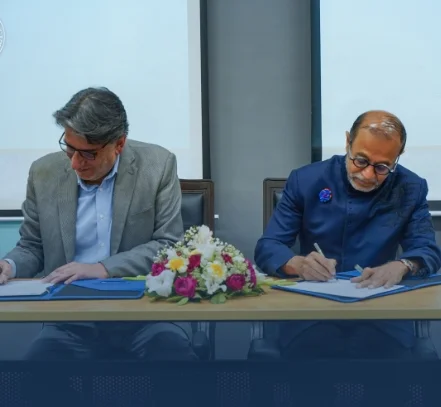The Imam Ali Ibn Abi Talib (A.S.) Endowed Faculty Chair in Wisdom and Humanities was inaugurated at Habib University's Tariq Rafi Lecture Hall on Friday, March 03, 2023.
This endowed faculty chair is a significant milestone for Habib University as it advances its intellectual pursuits.
It is named after Imam Ali (A.S.), who is highly regarded in the Muslim world for his wisdom and morality.
As the first endowed faculty chair in wisdom traditions and humanities worldwide, it establishes Habib University's leadership in promoting the scholarly study and teaching of sapiential traditions.

The Jeewanjee family's contribution to the Imam Ali Ibn Abi Talib (A.S.) Endowed Faculty Chair at Habib University is an excellent example of how the Pakistani diaspora can impact higher education in Pakistan. Zain and Farzana Jeewanjee, successful businesspersons living in the United States, have chosen to invest in higher education in Pakistan, recognizing the importance of creating opportunities for the next generation of leaders. Their donation of the endowed faculty chair is not only a generous act of philanthropy but also a meaningful contribution to Pakistan's intellectual development.
At the inauguration event, guests arrived, including members of academia and Habib University's community of donors and supporters, who had the opportunity to network and mingle before the formal proceedings. Dr. Najeeb Jan, Associate Professor of Comparative Humanities at Habib University, welcomed the attendees and remarked that the support of philanthropists like Farzana and Zain Jeewanjee is essential in protecting the light of education. He then invited the keynote speaker, Dr. Sajjad Rizvi, Professor of Islamic Intellectual History at the University of Exeter, to deliver a speech on the role of Hikma in cognitive reparation today.
The speech given by Dr. Rizvi during the event was full of thought-provoking ideas that shed light on the significance of wisdom traditions and their applicability in the modern era. He emphasized that in today's world, where technology is overemphasized and superficial understanding is commonplace, the concept of Hikma or wisdom holds particular relevance. Dr. Rizvi explained that Hikma enables individuals to go beyond the surface level and acquire a more nuanced understanding of themselves and their relationship with the world around them. This deeper insight fosters empathy and an essential cognitive repair that helps in cultivating a better understanding of the world.
After Dr. Rizvi's speech, a panel discussion moderated by Dr. Nauman Naqvi took place, providing an opportunity for further exploration of the topic and audience participation. During the discussion, Dr. Naqvi questioned the essence of philosophy, noting the influence of Western schools of thought on its interpretation. The conversation later turned to cognitive reparations, with Dr. Rizvi emphasizing the need to move beyond traditional methods such as lectures and texts in order to decolonize the mind.
Mr. Wasif A. Rizvi, the President of Habib University, also expressed his views on the establishment and importance of the Imam Ali (A.S) Endowed Faculty Chair. He emphasized that this endowed faculty chair is a significant step towards fulfilling Habib University's mission of promoting intellectual exploration and academic excellence. He further highlighted that this Chair not only pays tribute to the legacy of Imam Ali (A.S), but it is also a valuable investment in the intellectual and spiritual growth of the university's students.
Giving in Islam is considered an act of great beauty and virtue. The Quran emphasizes the importance of giving to those in need, with the verse stating, "Those who spend their wealth (in Allah's cause) by night, by day, secretly, and openly, their rewards are with their Lord. There is no fear on them, nor shall they grieve" (2:274). Giving not only benefits the recipient but also purifies the giver's heart and soul.
Following this, Dr. Najeeb Jan expressed gratitude to the donors and invited Mr. Zain Jeewanjee to speak on the transformative power of philanthropy in education and the responsibility of the privileged to give back to society. "It is my honor to contribute to the advancement of higher education in Pakistan through this donation," stated Mr. Jeewanjee. He emphasized the role of philanthropy in strengthening academic institutions and creating opportunities for future leaders. According to him, investing in education can have a positive impact on society and help build a better future for all.
The establishment of the Endowed Faculty Chair in Wisdom and Humanities aligns with Habib University's mission of fostering critical thinking, intellectual curiosity, and cultural awareness within its academic community. This endowment will enable the Comparative Humanities Program to enhance its international reputation, expand its research capabilities, and contribute to the broader academic discourse on humanities.
Dr. Najeeb Jan expressed his appreciation for the donor's generosity and highlighted the Chair's significance in advancing Habib University's academic mission. He then invited President Rizvi and Mr. Jeewanjee to participate in the signing ceremony, signifying the official establishment of the Endowed Faculty Chair.
The formal establishment of the Imam Ali Ibn Abi Talib (A.S.) Endowed Faculty Chair in Wisdom and the Humanities was marked by a significant signing ceremony, which was followed by concluding remarks from Dr. Najeeb Jan and an invitation for guests to attend the Hi-Tea. The occasion provided an excellent opportunity for attendees to reflect on the importance of the event and connect with one another. Habib University's commitment to intellectual excellence and the advancement of society was highlighted, and the endowed faculty chair will serve as a lasting legacy that will inspire generations of students and scholars. Additionally, the event emphasized the vital role of the Pakistani diaspora in supporting the growth and development of higher education in Pakistan. By investing in education, the diaspora is not only contributing to their homeland but also helping to build a stronger and more prosperous future for Pakistan.